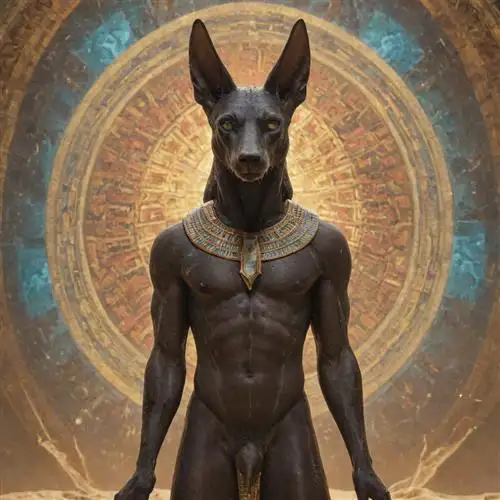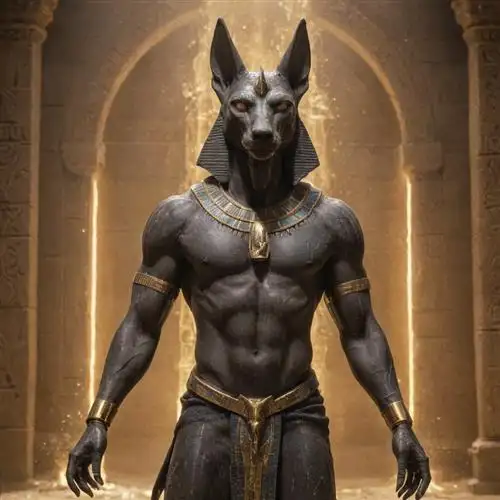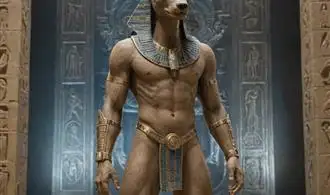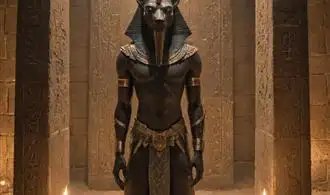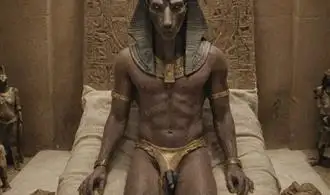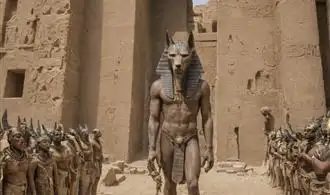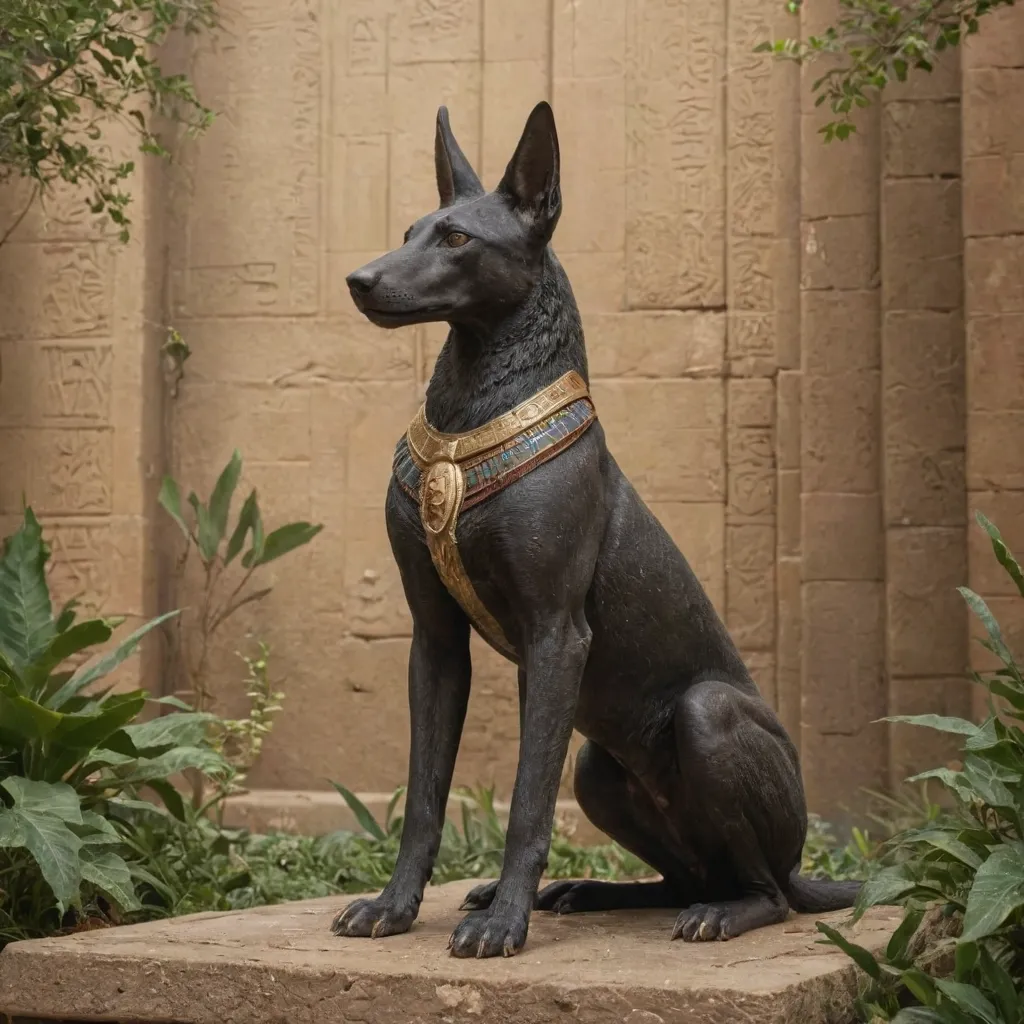
Unlock the Mysteries of Anubis's Guidance
Anubis, the ancient Egyptian god of the dead, holds a wealth of wisdom and guidance that can profoundly impact our lives. By understanding the nuances of Anubis's symbolism and teachings, we can tap into a profound source of self-discovery, spiritual growth, and inner transformation. One of the most surprising ways Anubis can improve your life is through the unlocking of the mysteries that lie within his guidance.
Anubis, the jackal-headed deity, is often associated with the process of mummification and the guidance of the dead through the afterlife. However, his influence extends far beyond the realm of the deceased. Anubis is also a powerful guide for the living, offering insights and protection during times of transition, transformation, and personal growth.
At the heart of Anubis's guidance is the exploration of the darker aspects of the human experience. He challenges us to confront our fears, our shadows, and the hidden parts of ourselves that we often prefer to keep buried. By embracing this journey of self-discovery, we can unlock a deeper understanding of our own psyche, our motivations, and the underlying patterns that shape our lives.
One of the most profound ways Anubis can improve your life is through his ability to help you navigate the liminal spaces – the threshold moments between life and death, light and dark, known and unknown. Anubis's presence during these times of uncertainty and transition can provide a sense of stability, clarity, and the courage to face the unknown with confidence. By learning to trust in Anubis's guidance, you can learn to navigate these challenging periods with grace and resilience.
Moreover, Anubis's connection to the underworld and the realm of the dead can serve as a powerful metaphor for the transformative processes that occur within our own lives. Just as Anubis guides the deceased through the afterlife, he can also guide us through our own personal "underworlds" – the emotional, psychological, and spiritual challenges that we face throughout our journey. By embracing Anubis's teachings, we can learn to navigate these dark and difficult times with a greater sense of purpose and understanding.
As you delve deeper into the mysteries of Anubis, you may also discover that his guidance extends to the realm of intuition, divination, and psychic awareness. Anubis is often associated with the ability to access hidden knowledge, to see beyond the veil of the physical world, and to tap into the wisdom of the unseen realms. By cultivating a connection with Anubis, you may find that your own intuitive faculties are enhanced, allowing you to make more informed decisions and navigate your life with greater clarity and insight.
Harness Anubis's Power to Navigate Life's Challenges
Anubis, the ancient Egyptian god of the dead and the afterlife, is often revered for his role in guiding souls through the complex journey of the afterlife. However, the profound wisdom and symbolism associated with Anubis can offer profound insights and practical applications for navigating the challenges of everyday life. By harnessing the power of Anubis, individuals can find a deeper sense of purpose, resilience, and inner transformation.
Anubis is known as the "Opener of the Ways," a title that reflects his ability to help individuals navigate the uncertain and sometimes treacherous paths of life. As a deity associated with transitions, death, and rebirth, Anubis can teach us valuable lessons about confronting our fears, embracing change, and finding the courage to transform ourselves. By focusing on Anubis's attributes, we can cultivate a more balanced and insightful approach to life's challenges.
One of the most profound ways Anubis can improve your life is by helping you confront and overcome your fears. Anubis is often depicted as a jackal-headed figure, a symbol of his role as a protector and guide in the afterlife. This imagery can serve as a powerful metaphor for facing our own inner demons and dark emotions. By invoking the presence of Anubis, individuals can find the strength to confront their fears, whether they are related to loss, change, or the unknown. Through this process of confrontation and transformation, we can emerge with a deeper sense of resilience and inner peace.
Moreover, Anubis's association with the afterlife and the journey of the soul can offer valuable insights into the nature of personal growth and transformation. Just as Anubis guides the dead through the complex and sometimes daunting process of the afterlife, we can view our own life experiences as a journey of self-discovery and growth. By embracing the symbolism of Anubis, we can cultivate a more mindful and intentional approach to navigating the ups and downs of life, seeing challenges not as obstacles but as opportunities for personal transformation.
Additionally, Anubis's role as the "Weigher of Hearts" can inspire us to cultivate a deeper sense of self-awareness and personal accountability. In the ancient Egyptian tradition, the heart of the deceased was weighed against the feather of Ma'at, the goddess of truth and justice. This symbolic act served as a means of evaluating the individual's moral character and deeds during their lifetime. By reflecting on Anubis's role as the judge of the heart, we can strive to align our actions and thoughts with our deepest values, fostering a greater sense of purpose and integrity in our lives.
Anubis's Secrets to Unlocking Personal Transformation
Anubis, the ancient Egyptian deity associated with mummification and the afterlife, holds secrets that can profoundly transform your life. As the god of the dead, Anubis offers insights into the power of personal transformation, guiding us through the process of shedding our old selves and embracing a new, more authentic existence.
One of Anubis's most profound teachings is the importance of confronting our own mortality. By acknowledging the fleeting nature of our physical form, we can cultivate a deeper appreciation for the present moment and the preciousness of life. This awareness can inspire us to let go of petty concerns, focus on what truly matters, and make the most of our limited time on Earth.
Anubis also emphasizes the significance of ritual and symbolism in the transformation process. Through the act of mummification, the ancient Egyptians believed that the deceased could be reborn into the afterlife. Similarly, we can use rituals and symbolic practices to facilitate our own personal rebirth, shedding the old and embracing the new.
For instance, you could create a ritual to honor the death of a particular aspect of yourself that no longer serves you. This could involve writing down your thoughts and feelings, burning the paper, and performing a cleansing ceremony. By acknowledging and letting go of the past, you create space for a new, more empowered version of yourself to emerge.
Anubis's teachings also emphasize the importance of the journey, not just the destination. The process of transformation is often messy, uncomfortable, and full of uncertainty. Anubis reminds us to embrace this uncertainty, trust the process, and have the courage to face the unknown. By doing so, we can unlock our true potential and discover the hidden depths of our being.
Furthermore, Anubis's association with the afterlife and the realm of the dead can inspire us to confront our deepest fears and anxieties. By facing our mortality and the inevitability of death, we can cultivate a profound sense of gratitude for the life we have and find the courage to live it more fully.
Anubis's Guidance for Navigating the Afterlife
The ancient Egyptian god Anubis is revered for his role as the guardian of the afterlife. Known as the jackal-headed deity, Anubis is believed to have a profound understanding of the journey that awaits us after death. By embracing Anubis's wisdom, we can better navigate the complexities of the afterlife and find comfort in the transition from this life to the next.
One of the core principles Anubis imparts is the importance of self-examination. He encourages us to confront our own inner demons, our fears, and our shortcomings, so that we can approach the afterlife with a clear conscience and a willingness to grow. This introspective process is crucial, as it allows us to shed the burdens of the past and enter the afterlife with a renewed sense of purpose.
Anubis also emphasizes the significance of rituals and ceremonies in the afterlife. He guides us in understanding the importance of mummification, the weighing of the heart, and other sacred rites that were integral to ancient Egyptian beliefs. By familiarizing ourselves with these practices, we can better appreciate the symbolism and spiritual significance that Anubis represents.
Moreover, Anubis is believed to be a protector and advocate for the deceased. He is said to guide the souls of the departed through the treacherous underworld, ensuring their safe passage to the afterlife. By aligning ourselves with Anubis, we can take comfort in the knowledge that we have a powerful ally in our final journey.
In addition, Anubis is associated with the concept of justice and moral accountability. He is responsible for weighing the hearts of the deceased against the feather of truth, determining whether an individual's soul is worthy of eternal rest. This principle serves as a profound reminder to live a life of integrity and compassion, as our actions in this world will have a direct impact on our experience in the next.
Anubis's Secrets for Finding Meaning and Purpose
Anubis, the ancient Egyptian god of the dead, holds a wealth of wisdom that can profoundly impact our lives in ways we may have never imagined. One of the most powerful and transformative insights we can glean from Anubis is his secrets for finding meaning and purpose. By delving into the mysteries Anubis has guarded for millennia, we can uncover a deeper understanding of our own mortality and the true essence of our existence.
At the heart of Anubis's teachings lies the recognition that death is not an ending, but rather a doorway to a profound spiritual awakening. By contemplating our own mortality and the fragility of life, we can begin to strip away the superficial distractions and focus on what truly matters. Anubis guides us to confront our fears, embrace the unknown, and cultivate a mindset of acceptance and resilience in the face of life's inevitable challenges.
One of the key ways Anubis can improve our lives is by helping us to find deeper meaning and purpose. Through his association with the afterlife and the journey of the soul, Anubis reminds us that our earthly existence is but a small part of a larger, cosmic narrative. By aligning ourselves with Anubis's wisdom, we can transcend the limitations of our individual perspectives and tap into a greater sense of connection and purpose. FOMO? Anubis Holds the Key to the Afterlife delves deeper into this concept, exploring how Anubis's guidance can help us overcome the fear of missing out and embrace a more expansive, fulfilling existence.
Anubis also offers invaluable insights into the importance of ritual, meditation, and self-reflection in our pursuit of meaning and purpose. By incorporating Anubis-inspired practices into our daily lives, we can cultivate a deeper understanding of ourselves, our place in the world, and the hidden forces that shape our experiences. This can lead to a greater sense of clarity, purpose, and inner peace, empowering us to make more authentic and fulfilling choices.
Moreover, Anubis's role as the guardian of the dead and the protector of the transition between life and death can inspire us to approach our own mortality with a sense of reverence and acceptance. By embracing Anubis's teachings, we can learn to let go of our attachment to the material world and focus on the eternal and immutable aspects of our being. This can free us from the shackles of ego and allow us to live with a greater sense of freedom, authenticity, and purpose.
Unleashing Anubis's Power for Spiritual Renewal
Anubis, the ancient Egyptian god of the afterlife, can be a powerful ally in your journey of spiritual renewal. This jackal-headed deity is often associated with embalming, mummification, and the protection of the dead, but his influence extends far beyond the realms of the departed. By tapping into the symbolic significance of Anubis, you can harness transformative energies that can rejuvenate your spirit and guide you towards a more fulfilling existence.
One of the primary ways Anubis can improve your life is through his connection to the process of death and rebirth. As the guardian of the underworld, Anubis presides over the transition from life to death, and his presence can serve as a reminder that endings often precede new beginnings. By embracing the cyclical nature of existence, you can learn to let go of the old and welcome the new, freeing yourself from stagnation and allowing for personal growth.
Anubis is also closely linked to the concept of transformation. In ancient Egyptian mythology, the god was responsible for guiding the deceased through the process of mummification, which represented a symbolic death and rebirth. This process can be seen as a metaphor for the personal transformations we undergo in our own lives. By invoking Anubis, you can tap into the energies of change and metamorphosis, empowering yourself to shed old patterns, beliefs, and limitations that no longer serve you.
Another way Anubis can enhance your spiritual renewal is through his association with the afterlife and the journey of the soul. As the gatekeeper of the underworld, Anubis is believed to weigh the hearts of the deceased, determining their worthiness for the afterlife. This ritual of judgment can be seen as a metaphor for the self-reflection and introspection necessary for personal growth. By invoking Anubis, you can engage in a deeper examination of your own thoughts, emotions, and actions, allowing you to identify areas in need of healing and transformation.
Furthermore, Anubis is often depicted as a guardian and protector, which can be particularly beneficial during times of spiritual transition and vulnerability. By calling upon the strength and vigilance of this ancient deity, you can create a safe and supportive environment for your personal transformation, shielding yourself from negative energies or external influences that may hinder your progress.
To harness the power of Anubis for your spiritual renewal, you may consider the following practices:
- Meditate on the symbolism and attributes of Anubis, visualizing the jackal-headed deity and the energies he represents.
- Incorporate Anubis-themed rituals, such as offerings, invocations, or devotional practices, into your spiritual routine.
- Seek guidance and wisdom from the ancient texts and mythologies associated with Anubis, allowing his teachings to inform and inspire your personal transformation.
- Align your personal goals and intentions with the transformative energies of Anubis, using his influence to facilitate the necessary changes in your life.
Anubis's Wisdom for Embracing the Cycle of Life and Death
Anubis, the ancient Egyptian god of the dead, holds profound wisdom for embracing the cycle of life and death. As the guardian of the afterlife, Anubis offers guidance on navigating the profound mysteries of mortality. One of the most essential teachings of Anubis is the importance of accepting death as a natural and integral part of the human experience. Rather than fearing the unknown, Anubis encourages us to approach the end of life with reverence and curiosity.
At the heart of Anubis's wisdom lies the understanding that death is not an end, but a transformative transition. The god's role as the embalmer and protector of the dead speaks to the sacredness of the physical body and its journey beyond the mortal plane. By contemplating Anubis's rituals and symbolism, we can cultivate a deeper appreciation for the cyclical nature of existence, where endings give rise to new beginnings.
Anubis's counsel also extends to the importance of honoring the dead and maintaining a connection with one's ancestors. The ancient Egyptians believed that the deceased continued to play an active role in the lives of the living, and that maintaining this sacred bond was crucial for individual and communal wellbeing. By incorporating Anubis's teachings into our own lives, we can learn to embrace the cycle of life and death, finding solace and strength in the knowledge that we are part of a grand, eternal tapestry.
One of the most powerful aspects of Anubis's wisdom is the way it encourages us to confront our own mortality with openness and vulnerability. How to Understand Anubis and the Afterlife in 10 Minutes delves deeper into the god's role as a guide through the afterlife, offering insights on how to approach the unknown with courage and curiosity. By contemplating Anubis's teachings, we can cultivate a sense of inner peace and resilience, empowering us to navigate the complex and often daunting realities of life and death.



